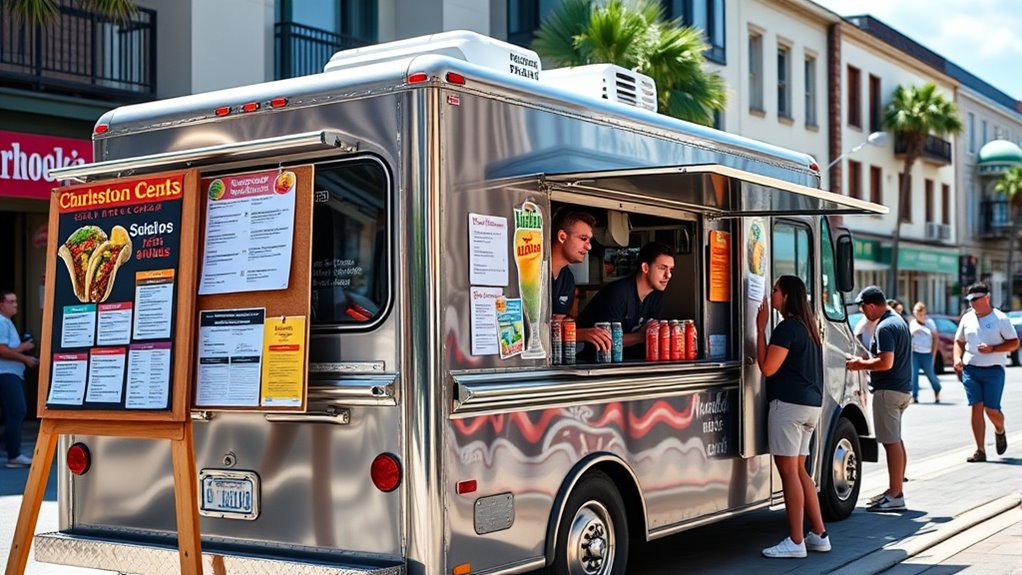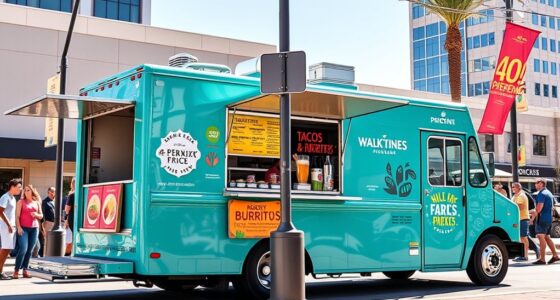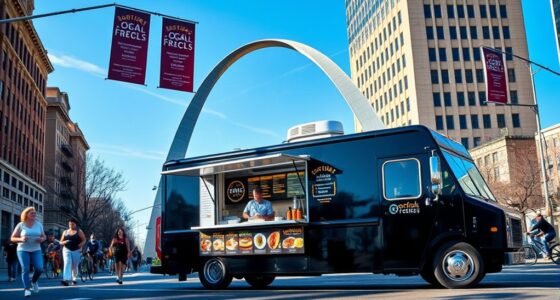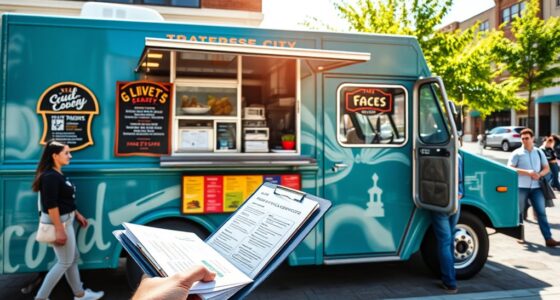To open a food truck in Charleston, WV, you’ll need essential permits like a Retail Class A license (~$1,583), a Kanawha County health permit, and a street vending permit with liability insurance. Budget around $40,000–$150,000 for your truck, equipment, and licenses. Choose busy locations near downtown, festivals, or colleges, and craft a streamlined menu with popular and health-conscious options. Effective marketing through social media and local events can boost your success—more strategies await to help you start strong.
Key Takeaways
- Obtain necessary permits including a Retail Class A License, Kanawha County Health Permit, and Charleston Street Vending Permit, with renewal requirements.
- Budget $40,000–$150,000 for truck purchase, $2,300–$5,000 for initial inventory, plus licensing and insurance costs.
- Choose high-traffic locations near downtown, events, universities, and residential areas with accessible parking and utilities.
- Create a streamlined menu of 4–6 core items with popular and health-conscious options, using fresh, local ingredients.
- Promote your food truck via social media, GPS apps, and local festivals to boost visibility and customer engagement.
Essential Permits and Licenses for Charleston Food Trucks
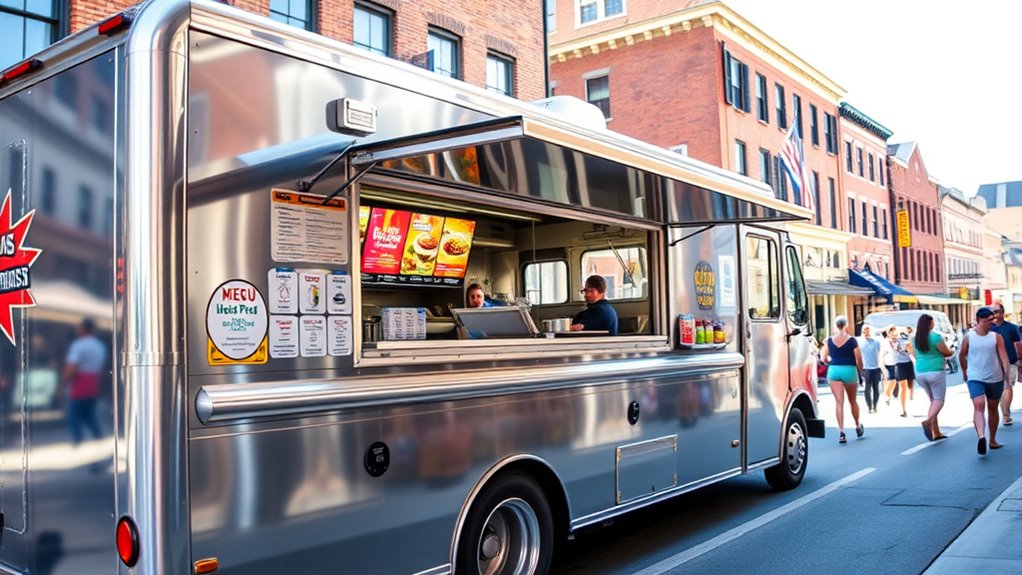
To operate a food truck in Charleston, West Virginia, you’ll need to obtain several essential permits and licenses. First, you must secure the Retail Class A License for private food truck operation, which costs $1,483.33 plus a $100 fee. This license requires a minimum $500 food inventory, a two-burner hot plate or air fryer, a sink with hot and cold water, and refrigeration of at least 10 cubic feet. You’ll also need to submit a floor plan, lease agreement, local approval, and proof of food safety compliance. Additionally, you must acquire a Kanawha County Health Permit to sell prepared food and a Charleston Street Vending Permit, which requires liability insurance and a $20 fee. These permits guarantee legal operation and adherence to safety standards in Charleston. The permits and licenses are specific to West Virginia state regulations, and they must be renewed regularly to maintain compliance. Ensuring compliance with local regulations helps prevent potential fines or shutdowns.
Budgeting for Your Mobile Food Business
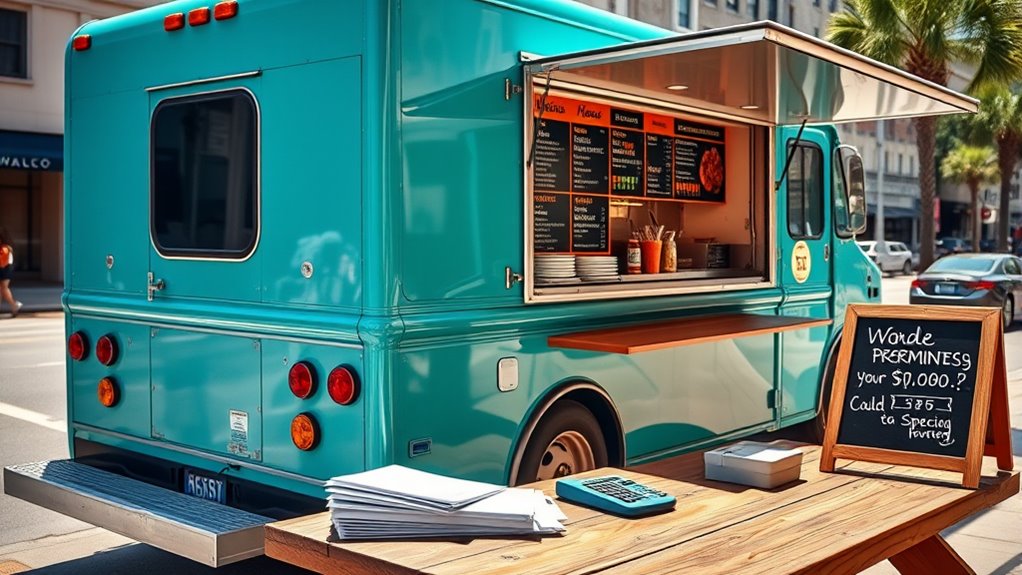
Budgeting for your mobile food business requires careful planning to cover initial startup costs and ongoing expenses. Your biggest upfront investment will likely be the truck itself, costing between $40,000 and $150,000 depending on new or used and customization. Kitchen equipment can add up to $45,000, while initial inventory—ingredients and serveware—ranges from $2,300 to $5,000. Licensing, permits, and insurance in Charleston can total around $1,500 to over $28,000, including health and vendor fees. Operating costs like fuel, maintenance, staffing, and supplies run about $4,600 monthly, with marketing taking another 12-20% of revenue. Parking permits and participation in local events also add to your expenses. Proper budgeting makes sure you’re prepared for every stage of your food truck’s launch and growth. Understanding local regulations helps prevent unexpected costs and ensures compliance from the start. Additionally, considering cost-effective marketing strategies can help maximize your reach without overspending.
Prime Locations for Food Truck Success in Charleston
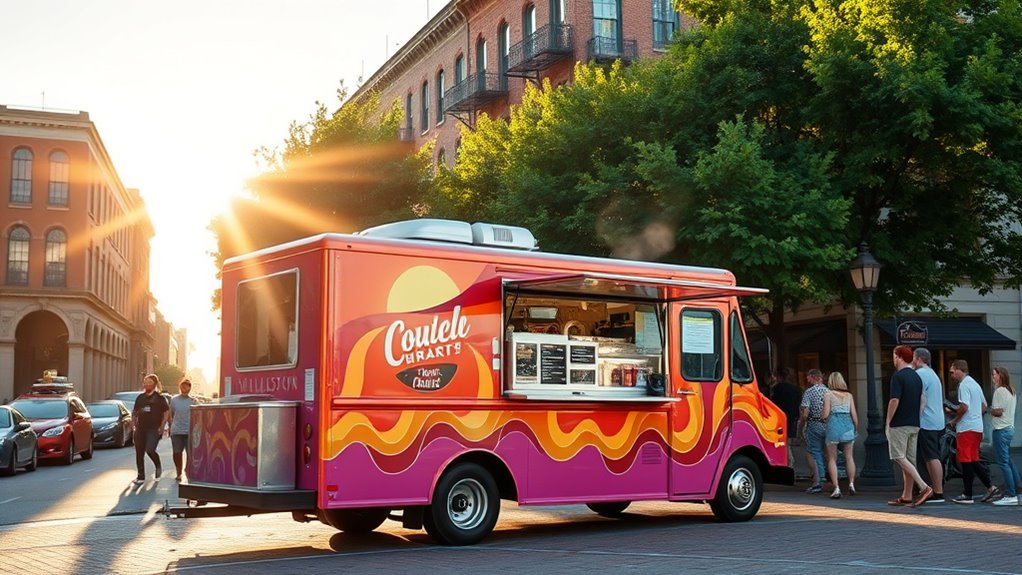
Choosing the right locations is essential for your food truck’s success in Charleston. High-traffic downtown areas near Capitol Street and Kanawha Boulevard draw large crowds, especially during lunch and evenings, with steady weekday customers from nearby offices and government buildings. Seasonal events and festivals further boost foot traffic. Streets with outdoor seating and plazas provide convenient, legal parking spots. Weekly events like Food Truck Wednesdays on Capitol Street create reliable crowds. Large festivals, farmers markets, and sporting events offer lucrative opportunities. Locations near the University of Charleston and technical colleges attract students, staff, and campus events, increasing demand. Residential neighborhoods hosting block parties or community events also welcome food trucks, helping you build local loyalty. Ensure your chosen sites have accessible parking, utilities, and comply with zoning regulations. Overview of Charleston Food Trucks serves as a vibrant backdrop for these strategic location choices, highlighting the importance of understanding the local scene to maximize your success. Incorporating boho decor elements into your food truck’s branding or serving area can create a distinctive and inviting atmosphere that attracts more customers and encourages repeat visits.
Crafting a Menu That Delights Customers
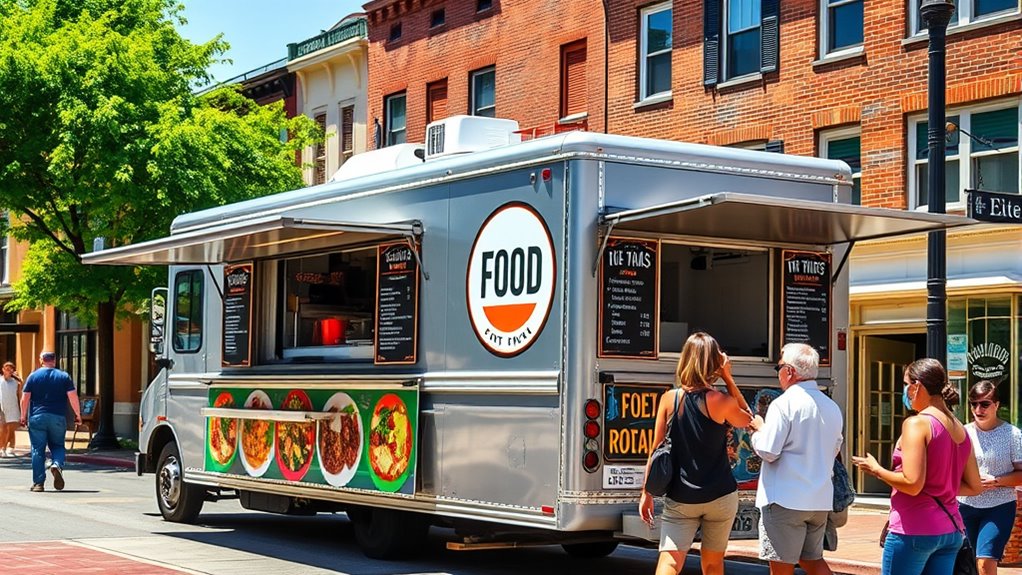
A well-crafted menu can set your food truck apart in Charleston’s bustling market. Focus on a variety of popular concepts, like classic burgers, pizza, or fusion dishes, to appeal to diverse tastes. Incorporate health-conscious options such as vegan, gluten-free, and keto-friendly items, catering to rising dietary trends. Keep your menu streamlined with 4–6 core items, allowing for efficient prep and consistent quality. Use bold flavors and vibrant presentation to make your offerings memorable and shareable on social media. Introduce seasonal or rotating specials to maintain customer interest and encourage repeat visits. Personalize core items with unique toppings or sauces, and consider locally sourced ingredients for authenticity. Regular menu updates and customer feedback help keep your offerings fresh and relevant. Menu flexibility allows you to adapt quickly to customer preferences and seasonal availability. Additionally, selecting versatile ingredients can facilitate the use of self-watering plant pots for fresh herbs or garnishes, enhancing your food presentation and sustainability efforts.
Effective Marketing Strategies to Grow Your Food Truck Business
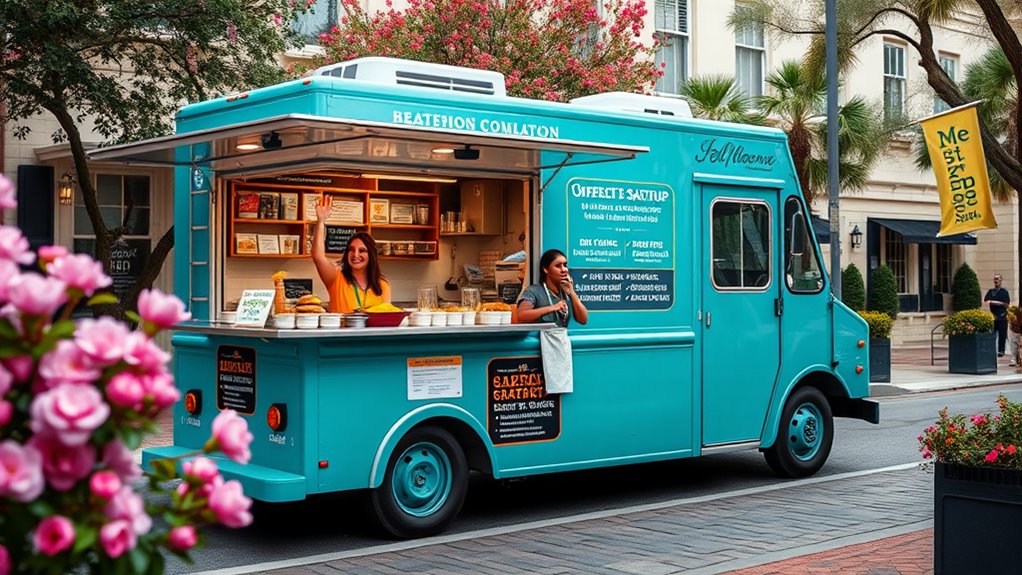
To effectively grow your food truck business, leveraging social media marketing is essential, as it directly connects you with your local audience and boosts visibility. Facebook is especially powerful, with 75% of food trucks maintaining active profiles. Regular social media activity can increase sales by an average of 20% and encourage customers to spend about 15% more. Use the table below to understand key benefits:
| Benefit | Impact |
|---|---|
| Increased visibility | Attracts new customers |
| Customer engagement | Builds loyalty |
| Discovery via ads | 40% of new customers find you online |
Participating in local festivals and using GPS-enabled apps further enhances your reach. Digital strategies help you target the right audience and maximize growth. Incorporating vertical storage solutions into your setup can optimize space and make your operations more efficient.
Frequently Asked Questions
How Long Does the Permit Approval Process Typically Take in Charleston?
You’re wondering how long the permit approval process takes in Charleston. Generally, it takes around three weeks from the time you submit a complete application to the Local Health Department. During this period, your application is reviewed, and an inspection is scheduled. Delays can happen if your paperwork is incomplete or if your truck doesn’t meet health standards. To avoid issues, plan ahead and verify all documentation is thorough.
Are There Any Restrictions on Operating Hours for Charleston Food Trucks?
Imagine your food truck as a lively ship sailing Charleston’s streets, but even ships must heed the harbor’s rules. You can operate flexibly, yet some restrictions apply. Trucks with alcohol permits follow set hours, while others enjoy more freedom, depending on location and permits. Be mindful of proximity to intersections and designated spots, which could limit your hours. Always check local regulations to keep your journey smooth and compliant.
Can I Operate My Food Truck Year-Round in Charleston’s Climate?
You can operate your food truck year-round in Charleston’s climate, but you’ll need to prepare for cold winters with lows near or below freezing. Install reliable heating, waterproof your truck, and consider snow and ice management strategies. Weather-resistant materials, flexible hours, and seasonal menu options can help. Keep in mind local regulations and insurance costs. With proper planning, you can keep your business running smoothly despite Charleston’s humid, snowy winters.
What Are the Specific Parking Regulations for Food Trucks in Charleston?
Your curiosity about Charleston’s parking rules is as essential as the city’s heartbeat! You must park only in legal public spaces, avoid intersections by at least 20 feet, and stick to designated hours—loading zones after 6 p.m. and before 4 a.m. Keep clear of utility covers and guarantee pedestrians, including those with disabilities, have at least 42 inches of space around your truck. Always display permits and follow safety rules to avoid penalties.
Are There Any Local Grants or Financial Assistance Programs Available?
You can access several local grants and financial assistance programs in Charleston. The city allocates funds for food initiatives, including SNAP incentives and community projects, which might support your food truck. State and federal programs like ARPA and USDA grants also offer opportunities for funding, especially if your truck promotes food security or community health. Nonprofits like TGKVF may consider grants for projects with social or health impacts, helping you fund your venture.
Conclusion
Starting your food truck in Charleston is exciting, but remember, over 60% of new food trucks thrive within their first year by choosing the right permits, locations, and marketing. By carefully planning your menu and targeting busy spots like downtown or college campuses, you set yourself up for success. Stay flexible, adapt to customer tastes, and keep your marketing fresh. With dedication, you’ll turn your food truck into Charleston’s go-to spot and enjoy a flavorful journey ahead.
